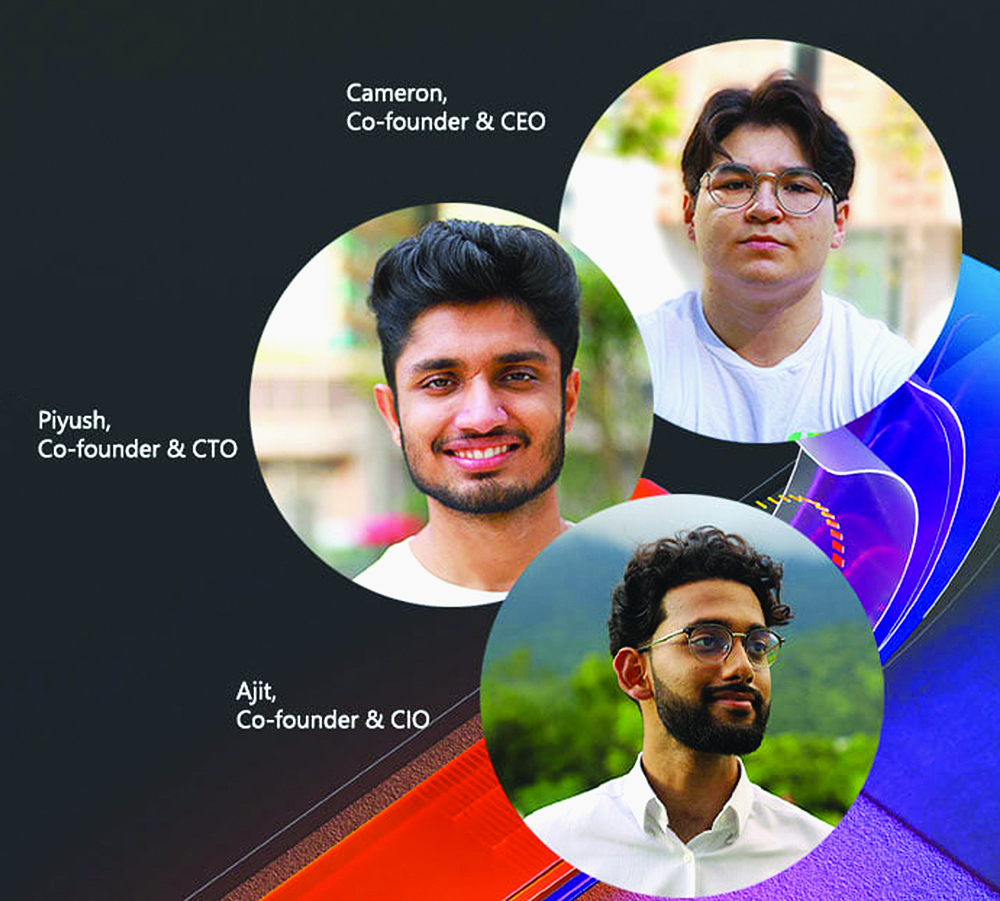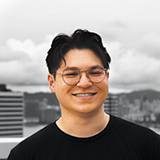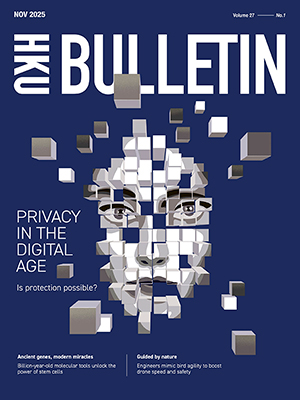November 2020 | Volume 22 No. 1
Mindful Health
Described on its website as ‘a mental health companion for you and your therapist’, Hollo was first conceived three years ago as a solution for young people with mental health issues who tended to fall between the gaps when it came to getting treatment.
The concept came from Cameron van Breda, who is in his fifth year studying Molecular Biology and Biotechnology, with a minor in Science Entrepreneurship. “We felt mental health aid, and even mental health awareness, were not being talked about among the young,” he said. “In Asia, stress in academics and family life can be really tough on young people, and unfortunately suicide is not uncommon. I had lost one of my close friends when I started building the project in 2018, and it solidified the idea in my head that this needs to be resolved.”
He teamed up with Piyush Jha, freshly graduated with a Bachelor of Engineering in Computer Science, and Ajit Krishna Namakkal Raghavendran who is in the fifth year of his Bachelor of Engineering in Computer Science course.
Key to their thinking was tackling the issue from two angles – that of the patient and that of the therapist – and to develop a tech-based, comprehensive mental health management tool, with an interactive mobile app for users and a case management dashboard for therapists and NGOs. It’s a collaborative and scalable mental health platform which aims to cut the heavy cost of mental health care for youth and to make support more accessible,” said Ajit. “Our goal is to give users – whether they are going through stressful periods in life, or depression or anxiety – access to a tool that helps gauge their mental health and wellbeing easily through clear visuals and then suggests actionable steps.”

Team members Cameron van Breda, Ajit Krishna Namakkal Raghavendran and Piyush Jha met at HKU.
Record, review, react
“We designed our solution to go through a process of three steps,” said Cameron. “Record (the data points), Review (our simple dashboard), and React (to these highlighted patterns and mental health effects with actionable insights).
“For example, when users complete their first screening and check-in, we record their expressions as they respond to a questionnaire that is aligned to industry standards. That video is then used for multiple purposes, namely, to attain the data points of their current emotional state, their sleep quality, their heart rate (as an indicator of current stress levels) and taking insights from their latest social media and responses.”
The team collate the results, and present users with a dashboard designed to be easily understandable. Using artificial intelligence (AI) and machine learning, they map out the user’s symptoms and create predictive models to understand a patient’s risks and potential relapses. “We then notify them of potential mental health issues and how to practise preventative measures either through self-care or by seeking professional help,” said Cameron.
On the treatment side of the equation, Hollo then feeds this data into a network of NGOs and counsellors so they can be alerted to potential high-risk cases without breaching privacy, and initiate the outreach to high-risk individuals. The team facilitate this relationship between the industry professionals and the users by allowing the counsellors to manage their cases on Hollo’s web-app platform. They also encourage NGOs and counsellors to enlist Hollo’s services to help digitally transform their standard practice.
“They can benefit from effective monitoring and be alerted to any changes in their client’s day-to-day status,” said Cameron. “This also streamlines the administrative process, and it is how Hollo will generate initial revenue as a software and service provider for the NGOs.”

Hollo was named the 2020 Microsoft Imagine Cup World Champion – the first team from Hong Kong to take top honours since the launch of the Microsoft Imagine Cup in 2003.
Microsoft Imagine winners
Team Hollo has now made the leap from developing the app to launching a start-up, and along the way they have won several awards, including the Microsoft Imagine Cup – the first team from Hong Kong to win since the annual competition was launched in 2003. More than 28,000 students from over 200 countries entered the competition. Hollo’s prize included a mentoring session with Microsoft CEO Satya Nadella, US$100,000 in prize money and US$50,000 Azure grants which they used to launch their start-up.
Piyush said: “The most exciting moment for me was when Brad Smith [Microsoft President] decided to advance Hollo to the final round and praised us regarding the concept. It was a great feeling of accomplishment and the competition was a full-on learning experience. We came to understand the shortcomings of our app, pivoted our idea and, with the help of amazing mentors like Microsoft’s Brian Clark, understood how to pitch and present the idea in a way which truly reflects what Hollo is trying to achieve.”
Team Hollo is now beginning further trials with their partner NGOs, readying the app further for the public to use in their day-to-day lives, while also forming research alliances with HKU and searching for more collaborations in Hong Kong and abroad.
We felt mental health aid, and even mental health awareness, were not being talked about among the young. In Asia, stress in academics and family life can be really tough on young people, and unfortunately suicide is not uncommon. I had lost one of my close friends when I started building the project in 2018, and it solidified the idea in my head that this needs to be resolved.

MR CAMERON VAN BREDA

